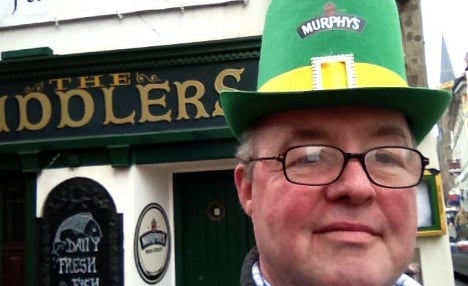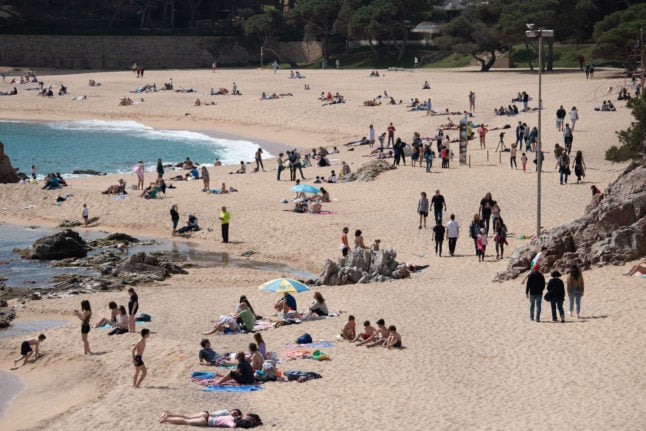After landing a job as a chef in Essen over 15 years ago, 63-year-old Irishman
Ray decided to establish his own little piece of home in Bonn and has been running the city’s first Irish pub ever since. Despite a constantly changing local demographic which has brought an influx of international business, he says 85 percent of his regular visitors are still German. What attracts them to the Fiddlers in such large numbers? In a word, the “authenticity” of the place.
Where are you located and what do you do?
I am Bonn’s original Irish publican and have been running Fiddlers Irish Pub in the beautiful neighbourhood of Endenich, in the heart of the city’s Kulturmeile, for 15 years. I rent the premises and have lived there for the past 13 years with my German partner Marianne Michels, who has taught me German and helps me understand German laws and regulations.
What brought you to Germany and how did you land your job?
I started off working as a chef in Essen, in an Irish pub called the Fritzpatricks.
After six months the owner and I decided to set up our own pub in Bonn. He later left and opened another pub, and we went our separate ways. I ended up the sole landlord of this place.
What are the key differences in being a pub owner here and in Ireland?
I see my pub as a little piece of Ireland in Bonn. It is a place for conversation and a place to relax. Although I’ve had to adapt to my surroundings at various times, I’ve always retained an authentic Irish feel. Our kitchen always uses Irish products – if we can’t import them, we make them ourselves. We even make our own ketchup! We host an extremely popular pub quiz on Monday, have a Celtic music session every Wednesday and karaoke on Friday and Saturday. On Sunday we cook up a roast to feed the growing local community of students, whose mensas or canteens are closed on Sundays.
What attracts Germans to Irish culture?
The element of Irish culture most popular with the Germans is the “authenticity”. We have our own resident butcher who can be seen in action while he works in the kitchen, and our German customers love the authenticity of the spectacle. The rawness of the music and the taste of the beer, all these things make for a great atmosphere that gives them a unique experience.
How international is your clientele?
In recent times it has become very international. I would say Germans still make up around 85 percent, but the recent influx of Erasmus students and international business has had an effect. In the past few years, 300 new student apartments have been constructed within 100 metres of the pub, and we’ve recognised the need to readjust our prices for the new demographic. Bonn’s United Nations connections are also growing with new conference centres springing up, and that brings a lot of international business. The city is changing all the time.
How important is it for you to be able to speak German at work?
I can speak to the bank manager or the corner shop owner in German, but in the pub I speak English with my customers. I have to maintain that air of authenticity – when people come to an Irish pub, they want to hear that immediately recognisable accent.
What advice would you give to foreigner considering setting up a bar or restaurant in Germany?
First and foremost, read the regulations! There are so many rules and regulations in this country that it’s good to be prepared. I’ve been running the Fiddlers for 15 years, so that’s 15 years of mistakes!
What do you like most about working in Germany?
What’s impressed me most is how high standards are, and that applies to everything. The transport system is also incredibly efficient – I have a choice of four different routes just to get to Cologne, and the journey only takes half an hour! As a city, Bonn is quiet and peaceful, and I feel safe wherever I go. That’s also important.
Have your views on Germany changed since your arrival?
I thought initially that it would be completely organised and everything would run smoothly with military precision. I’ve realised since that although the system is impressive, not everything functions perfectly in Germany. Instead, there is a vast array of laws to keep things running as efficiently as possible. When something goes wrong, the Germans simply create a new law. One new law to fix each fault that arises.
Do you see your future in Germany? Do you plan on staying?
Yes, I plan on staying indefinitely, but I have children in Ireland so I go back regularly. I also read the Irish papers every day, so I keep up to date with events back home.
Want your German career featured on The Local? Contact us at: [email protected]
Interview conducted by Matthew Luxmoore.



 Please whitelist us to continue reading.
Please whitelist us to continue reading.
Member comments